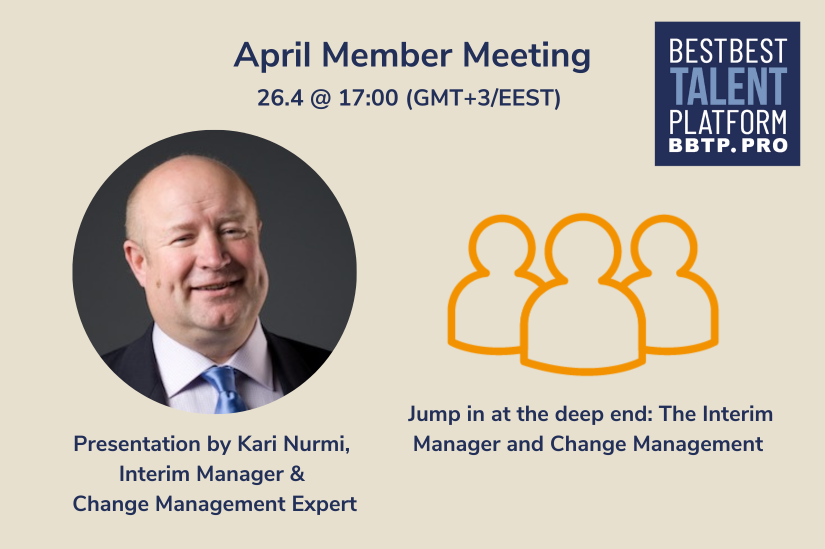Kari Nurmi has been an interim manager for more than 12 years and has been working in C-level roles for over 20 years.
Kari is a lawyer with court practice, holds an eMBA, and speaks four languages — Finnish, English, Swedish, and German. These skills have led him to jobs in both Finland and Germany. Along with B2B trade and international business, Kari specializes in change management. He has managed companies through changes like company turnaround, reorganizing, and result improvement.
On April 26th, 2023, BBTP members gained wisdom from Kari’s extensive experience at our monthly member meeting. In case you missed it, we rounded up a few key takeaways from his presentation.

The interim manager and change management
Interim management is a broad category. However, in many situations where interim talent is needed, the common denominator is change.
Change in people. Change in speed. Change in results. — Change can come in many different forms. Whatever shape it may take, change management involves strategic leadership through change.
Although not all interim positions explicitly state "change management" in the job description, the basic assumption is that an interim manager should not shy away from change. And in cases involving company turnaround or transitions — areas where Kari shines — interim managers are often expected to lead change from their first day on the job.
How do you lead change from day one?
Kari gives 5 tips to begin leading change:
Tip #1: Don’t believe everything you hear. In times of transition, people talk. Check the facts and try to understand why people are saying what they are saying. Remember that there can be multiple truths at the same time, just from a different perspective.
Tip #2: Don’t believe everything that you are thinking. Everyone has biases. Even someone with years of leadership experience. Evaluate your own biases throughout the change process (e.g. Kahneman: Thinking, Fast and Slow).
Tip #3: Don’t be political. You are in your position to make a change, not to fulfill somebody’s hidden agenda. Your client (the company) is paying for you and you should work for the company.
Tip #4: Tell the truth. As an interim manager, you have to build trust from day one. Tell the truth, tell if you don’t know the truth, and evaluate all the information you obtain before sharing it.
Tip #5: Lead by example. You are paid to be calm and professional. Make sure your actions match the goal you want to achieve.

What tools do you need to manage change effectively?
When beginning an interim position, a cool and level head can help you get off to a good start. However, transitions are rarely straightforward, and challenges are bound to appear. Kari shares some tools for overcoming challenges and managing change successfully. Kari describes tools from two main categories: competencies (what you should bring to the table) and resources (what the company should provide).
Competencies you should possess
From the beginning of a contract, the interim manager should be able to develop a strategic plan for achieving the desired outcome of the assignment. You should have the ability to ask good questions, gain necessary information from relevant stakeholders, and map out goals that work for you and the company. In short, Kari says, “If you want to make a change, there needs to be a detailed plan on how to execute it”.
While developing and executing a plan, good communication is essential. From Kari’s point of view, “Leading the change is very much a communication issue.” Good communication from an interim manager takes a lot of effort. It means keeping up a positive but realistic spirit (telling the pros and cons but also why the pros are bigger and more important than the cons) and sharing a consistent core message in as many ways as you can. At the end of the day, you must communicate in a way that resonates with your audience. Be sure to give real-life examples that show change is possible.
In addition to plan development and communications, Kari also believes that follow-through is an essential competency. An interim manager’s follow-through should go beyond executing tasks but encompass a larger quality of leadership. In the interim manager role, leadership is a service function that allows you to evaluate possibilities, offer prioritization services, give feedback, enhance cooperation, and navigate change (in the right direction and at the right speed). Don't forget that target-setting and follow-up are important parts of the process. Overall, everyone in the company should feel that your words and actions match and that you are moving the organization forward.
Resources you should utilize
You can be a great interim manager, but without support from the company that hired you, it is difficult to get anything done. This is why Kari also mentions essential resources for successful change.
The first essential resource is the power of attorney. In order to manage change in turbulent situations, decisions will need to be made. Before you agree to an interim position, it is important to ensure you will have the proper authority to make impactful decisions. Kari advises interim managers to check in advance if they have strong enough power of attorney.
Another resource that Kari emphasizes is stakeholder commitment. To follow the plan and targets that have been developed, ensure there is a strong commitment from all key members of the leadership team and any team members who will need to help carry out changes.
The last resource to be mentioned is rewards. If people are to put in the effort to change, something has to improve. You need to have some rewards for the organization and the people in it. Discuss what these can be with the company as soon as you can.
What happens if you do not have every tool at your disposal?
While you can manage with limited resources, it is important to know that it can hinder the speed and effectiveness of change. Competencies, on the other hand, are very hard to do without (they are essential for a reason). If the interim manager is to be an instrument of change, then they must be committed to maintaining their competencies. Be prepared to maintain your instrument!

Kari's final tips for change-making interim managers
For all who listened to Kari's presentation — filled with examples and anecdotes from hands-on experience— it was clear that BBTP members were in the presence of an expert. Although the full contents of Kari's presentation are reserved for those who attended the meeting, Kari's final tips are too good not to share. We hope they are useful when leading change in the future.
- If you believe that you can make the change alone, Good luck!
- Change takes time, no matter what the demands are.
- People are not stupid, there have to be some rewards.
- You can’t crush the resistance. Find a way to integrate them into the project.
- It is not about you, it is the results!
Big thanks to Kari Nurmi for sharing his words of wisdom at our April member meeting!
Did you find something particularly insightful from this blog post or from the member meeting itself?
Leave a comment below or connect with Kari on LinkedIn.
Are you interested in attending an upcoming BBTP monthly member meeting?
Details surrounding the upcoming meeting can always be found on our platform. Log into Best Best Talent Platform and find the meeting details on the home page under "Exclusive Contents".
Not yet a BBTP member?
Register today, in 2 minutes or less.
BBTP monthly meetings are gaining momentum. Don’t miss out on this opportunity to connect with your peers.
The BBTP team is always on the look-out for talent with something to share. If you would like to present at a BBTP member meeting, contact our Community Manager, Leah Martin at leah.martin@bestbesttalentplatform.com or fill out our contact form. Do not hesitate to reach out even if you do not yet have a topic in mind.
Our member meetings are just getting started and they grow each and every month. We sincerely hope to see you at an upcoming event.





